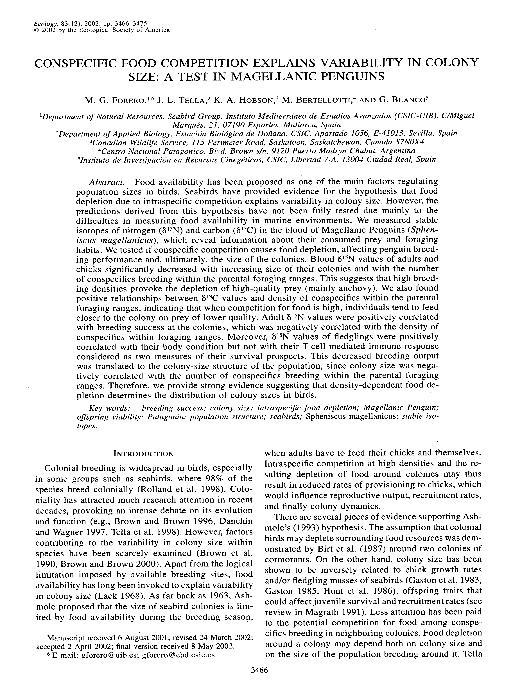Mostrar el registro sencillo del ítem
dc.contributor.author
Forero, M. G.
dc.contributor.author
Tella Escobedo, José Luis

dc.contributor.author
Hobson, K. A.
dc.contributor.author
Bertellotti, Néstor Marcelo

dc.contributor.author
Blanco, G.
dc.date.available
2020-03-11T15:54:44Z
dc.date.issued
2002-12
dc.identifier.citation
Forero, M. G.; Tella Escobedo, José Luis; Hobson, K. A.; Bertellotti, Néstor Marcelo; Blanco, G.; Conspecific food competition explains variability in colony size: a test in magellanic penguins; Ecological Society of America; Ecology; 83; 12; 12-2002; 3466-3475
dc.identifier.issn
0012-9658
dc.identifier.uri
http://hdl.handle.net/11336/99131
dc.description.abstract
Food availability has been proposed as one of the main factors regulating population sizes in birds. Seabirds have provided evidence for the hypothesis that food depletion due to intraspecific competition explains variability in colony size. However, the predictions derived from this hypothesis have not been fully tested due mainly to the difficulties in measuring food availability in marine environments. We measured stable isotopes of nitrogen (δ15N) and carbon (δ13C) in the blood of Magellanic Penguins (Spheniscus magellanicus), which reveal information about their consumed prey and foraging habits. We tested if conspecific competition causes food depletion, affecting penguin breeding performance and, ultimately, the size of the colonies. Blood δ15N values of adults and chicks significantly decreased with increasing size of their colonies and with the number of conspecifics breeding within the parental foraging ranges. This suggests that high breeding densities provoke the depletion of high‐quality prey (mainly anchovy). We also found positive relationships between δ13C values and density of conspecifics within the parental foraging ranges, indicating that when competition for food is high, individuals tend to feed closer to the colony on prey of lower quality. Adult δ15N values were positively correlated with breeding success at the colonies, which was negatively correlated with the density of conspecifics within foraging ranges. Moreover, δ15N values of fledglings were positively correlated with their body condition but not with their T‐cell mediated immune response considered as two measures of their survival prospects. This decreased breeding output was translated to the colony‐size structure of the population, since colony size was negatively correlated with the number of conspecifics breeding within the parental foraging ranges. Therefore, we provide strong evidence suggesting that density‐dependent food depletion determines the distribution of colony sizes in birds.
dc.format
application/pdf
dc.language.iso
eng
dc.publisher
Ecological Society of America

dc.rights
info:eu-repo/semantics/openAccess
dc.rights.uri
https://creativecommons.org/licenses/by-nc-sa/2.5/ar/
dc.subject
BREEDING SUCCESS
dc.subject
COLONY SIZE
dc.subject
MAGELLANIC PENGUIN
dc.subject
PATAGONIA
dc.subject.classification
Ecología

dc.subject.classification
Ciencias Biológicas

dc.subject.classification
CIENCIAS NATURALES Y EXACTAS

dc.title
Conspecific food competition explains variability in colony size: a test in magellanic penguins
dc.type
info:eu-repo/semantics/article
dc.type
info:ar-repo/semantics/artículo
dc.type
info:eu-repo/semantics/publishedVersion
dc.date.updated
2020-02-11T17:58:13Z
dc.journal.volume
83
dc.journal.number
12
dc.journal.pagination
3466-3475
dc.journal.pais
Estados Unidos

dc.description.fil
Fil: Forero, M. G.. Consejo Superior de Investigaciones Científicas; España
dc.description.fil
Fil: Tella Escobedo, José Luis. Consejo Superior de Investigaciones Científicas; España
dc.description.fil
Fil: Hobson, K. A.. Canadian Wildlife Service; Canadá
dc.description.fil
Fil: Bertellotti, Néstor Marcelo. Consejo Nacional de Investigaciones Científicas y Técnicas. Centro Nacional Patagónico; Argentina
dc.description.fil
Fil: Blanco, G.. Consejo Superior de Investigaciones Científicas; España
dc.journal.title
Ecology

dc.relation.alternativeid
info:eu-repo/semantics/altIdentifier/doi/http://dx.doi.org/10.1890/0012-9658(2002)083[3466:CFCEVI]2.0.CO;2
dc.relation.alternativeid
info:eu-repo/semantics/altIdentifier/url/https://esajournals.onlinelibrary.wiley.com/doi/full/10.1890/0012-9658%282002%29083%5B3466%3ACFCEVI%5D2.0.CO%3B2
Archivos asociados
